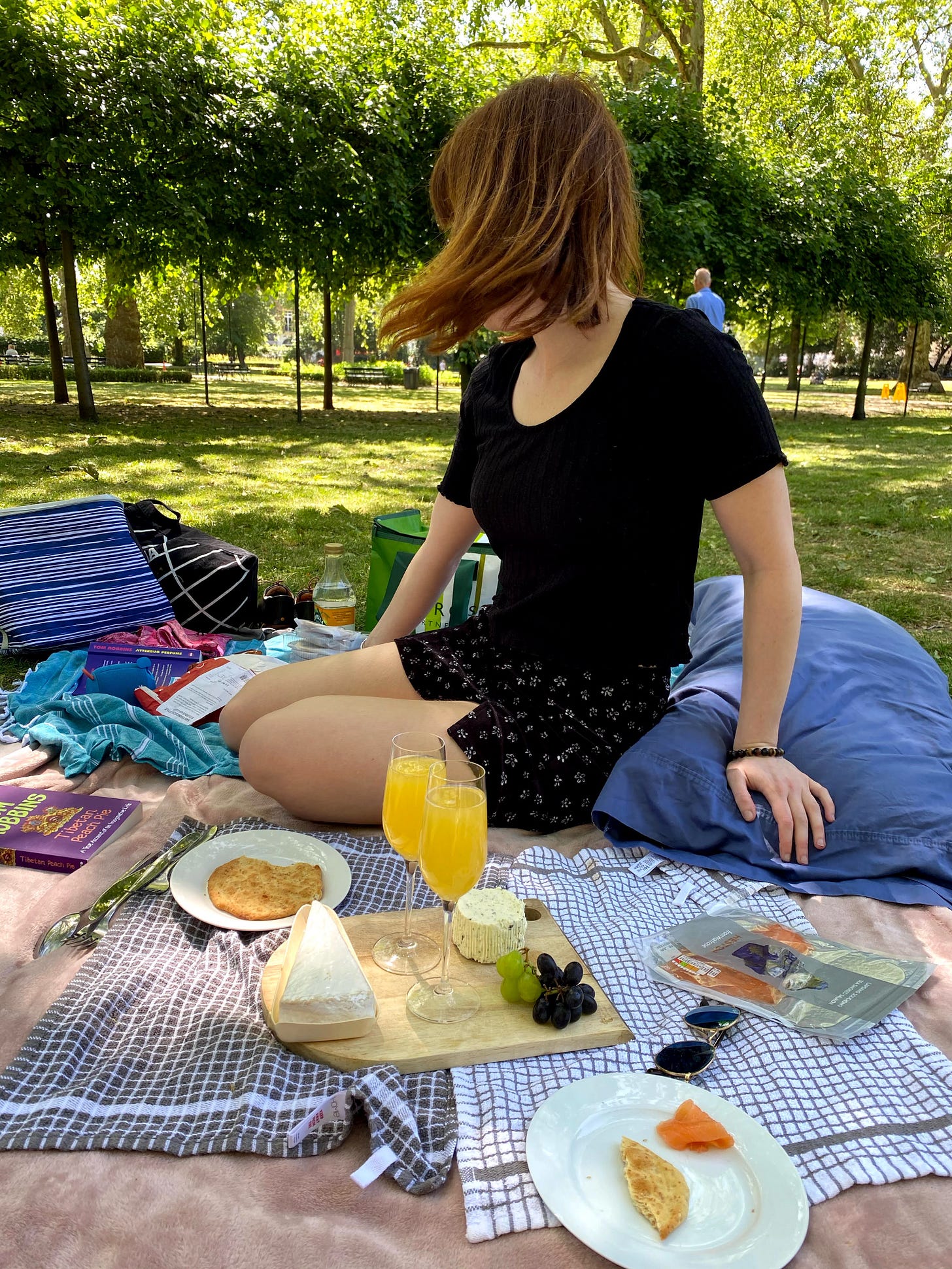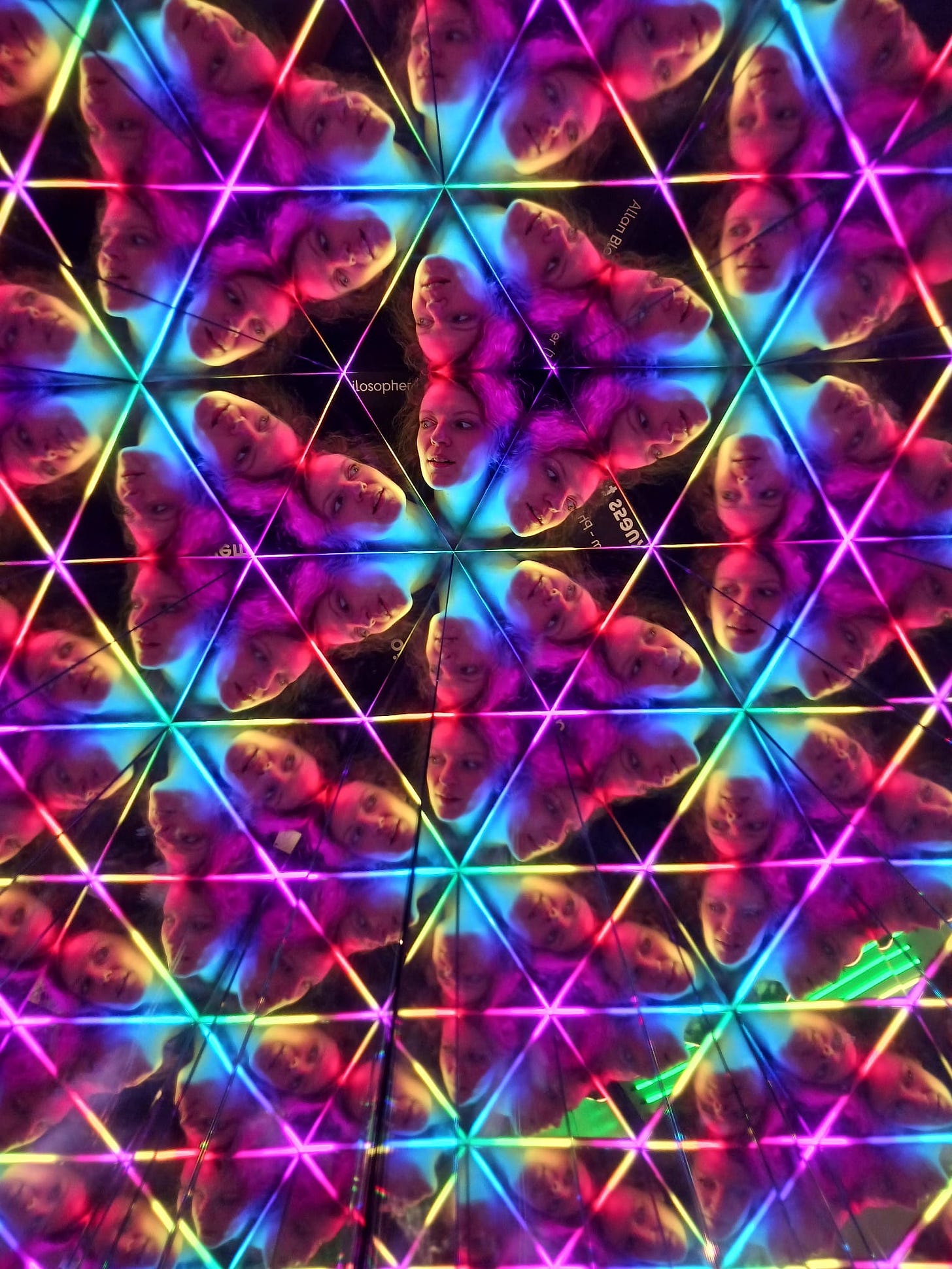LIFE - On confidence and the Origin of the World
Where confidence comes from in women, described with a painting, book and a friendship.
Welcome to the 16 new Mindforkers who subscribed since the last essay, on trusting our inner compass. If you haven’t subscribed, join the community of curious thinkers below.
“How do you do it?” She asked.
“Do what?” I responded.
“How do you move about the world with such confidence?”
My friend was always the type of person I hoped I’d become. She was so sure of herself, in her love of art, her exquisite taste in vintage clothes, and her depth and vulnerability while telling me stories about her past lovers. Her question shook me to my core. Where was the woman I knew?
The day we met, I laboriously scrubbed our shared kitchen counters in our postgraduate accommodation in London, a mere week after moving countries. You could see “academic scientist” arrogantly draping over my shoulders in the form of an old, over-worn hoodie. Practical, and utilitarian, I shifted to washing the dishes by hand.
She barged into the kitchen with a gleaming red bob, a tight black dress, audacious gold earrings, and an attitude. “Nice to meet you.” She grabbed something from her cupboard. “Sorry, I’ve got to go, I have a dinner date.” She left. I was immediately suspicious of her.
Yet she saw something in me. A dormancy, perhaps? Growing on me, she took me to art museums, house parties hosted by pretentious Parisians, and obscure charity stores filled with every variation of tweed blazer known to humanity.
I’d been hibernating in the lab, studying the genetic basis of sleep, enveloped in scientific methods, research papers and microscopic phenomena. The mental adventures she’d take me on were more than welcome - how does food influence culture? What unique qualities can we get from a location, and what does a location know exclusively about us?
Our acquaintanceship catalysed into a crackling friendship one day, on the floor of her room in our pyjamas, drinking cheap wine, slurping up Pad Thai noodles, discussing everything - the fate of humanity, where climate change might lead, and the power dynamics of sex.
Soon, these fearless discussions started flickering through my thoughts. They became our ritual.
One night, she noticed the postcard on her wall kept distracting me, making me nervous. “Oh, you wanna know what that painting is, huh?” She grinned, knowingly. I coyly accepted her unspoken invitation to appreciate the art piece.
The piece depicted a woman lying on a bed drizzled in silk sheets, legs open. Posing in between her thighs were the glistening fabrics of a woman I had been taught to look away from all my life. So I looked away.
My friend chuckled at my shyness. “That piece is called the L’origine du Monde - the Origin of the World.”
A long pause sat between us. She faced me, embodying her presence with glowing pride, playful confidence and said: “It’s called the Origin of the World because pussy is the centre of the universe and the creator of life.”
Blood rushed to my face, horribly embarrassed. She said p-word! How could my friend be so comfortable with saying it?
She wore her womanhood casually, elegantly and with mischief, like a soft, snug evening dress. Her aura suggested she knew what she wanted out of life. She ignited a hunger in me to find what I wanted.
A few years later, when she asked me how I moved through the world with such confidence, I was at a loss for words.
She wasn’t the first to comment on my confidence. To the terror and delight of the people who know me, I call instead of text, speak to strangers, and say what’s on my mind. Extravert personified. Confident, though?
One face is a gregarious external one. The other is fragile, and in my case, curled over an unfinished IKEA cabinet with shingles, while crying my eyes out watching Emily in Paris, seeing my friends achieve incredible heights as athletes, buying homes with their partners, and getting promotions at work. They had all the supposed sources of happiness and confidence that didn’t seem to fit me. Gregarious, fragile and completely unknown.
At this invisible precipice of self-discovery, my sister lent me a book.
“Pussy, a Reclamation” by Regena Thomashauer.
I accepted the book politely, never intending to read it. How indulgent, I thought, such a click-bait title for another forgettable self-help book.
I couldn’t have been more wrong about the book, in the best possible way. The author would transform my perspective on what it means to be me: a woman.
Discarding feminity in places of worship is a recent development in human history. For centuries, Goddesses were worshipped to bring harvests and prosperity. That’s until the power and sacredness of feminine divinity were largely lost to time.
Through this lens, Thomashauer raises questions I hadn’t thought to ask: what have you been taught about being a woman? Why don’t we ask for what we want? Why do we feel inadequate, like we’re “too much”?
Most of us are taught that by making others happy, we will be rewarded with happiness.
There is no more detrimental message to our self-worth since the opposite is true. A car’s tank must be full to contribute motion to the road. The emptier our tank, the more we search for meaning elsewhere, in careers, partners, friendships, etc.
An odd metaphor appears in aeroplane safety videos: if the cabin loses air pressure, an oxygen mask will fall from the compartment above you.
Before you assist anyone in need, place the oxygen mask over your face first.
Armed with this knowledge, I took the biggest risk yet. I started a personal research project. I ruthlessly explore and document what brings me joy and pleasure, without guilt, shame or expectation. I honoured myself every day.
Almost instantaneously, and to my immense surprise, my research notebook flourished into a monumental transformation.
The initial entries describe an empty, longing search. Slowly, what followed were fun unexplored ideas, playful takes, and a deep love - for even the tiniest sensations of warm tea on my tongue. Weirdly, as I honoured myself, others began to honour me too.
The bad days still come but they no longer knock me down. They allow me to look better, feel better, and more wholly express my work.
In future essays, I hope to share the tools and practices I’ve since developed as a writer, a scientist and a woman. They’ve grown, nurtured by Regena Thomashauer’s work, but the seed was sewn the day my friend and I discussed the painting, L’Origine du Monde.
My friend’s question about how I move through the world with such confidence was a fleeting moment in her week as her emotions moved through her. She retains her confidence and her femininity, lighting the beacon for me.
I hope I’ll be able to return the favour.
By keeping my beacon vibrant and well-lit, I could illuminate a path for others like me who are finding what they want, even if they struggle to say the p-word without blushing.
Thanks for reading Mindfork! Share with your friends if you fancy. See you soon xx
You can find the book by Regena Thomashauer here.
For more essays like this:





